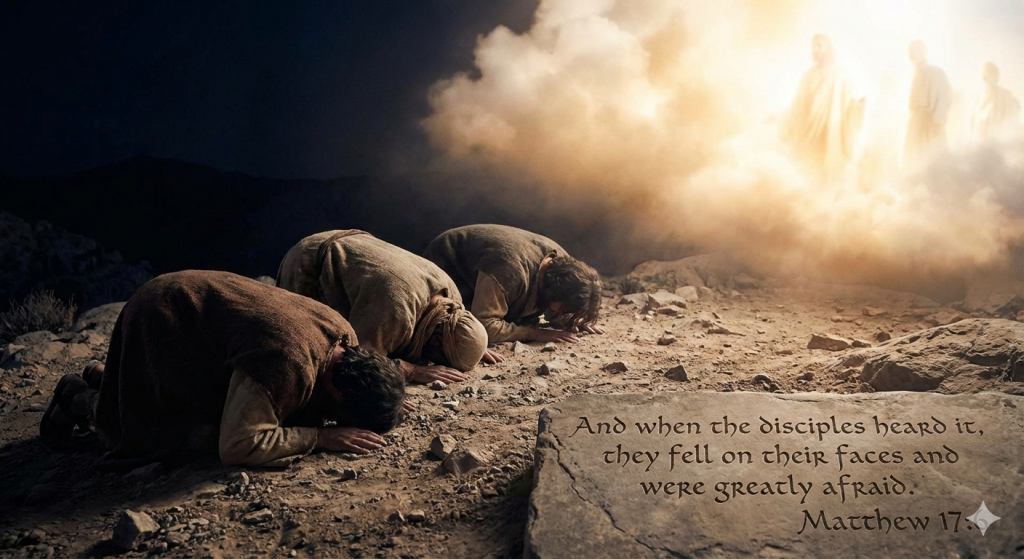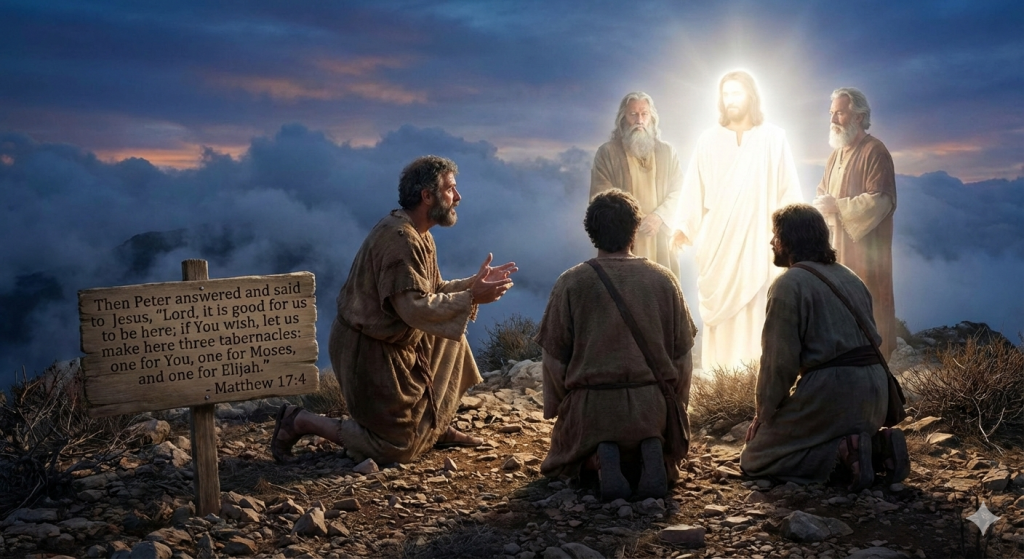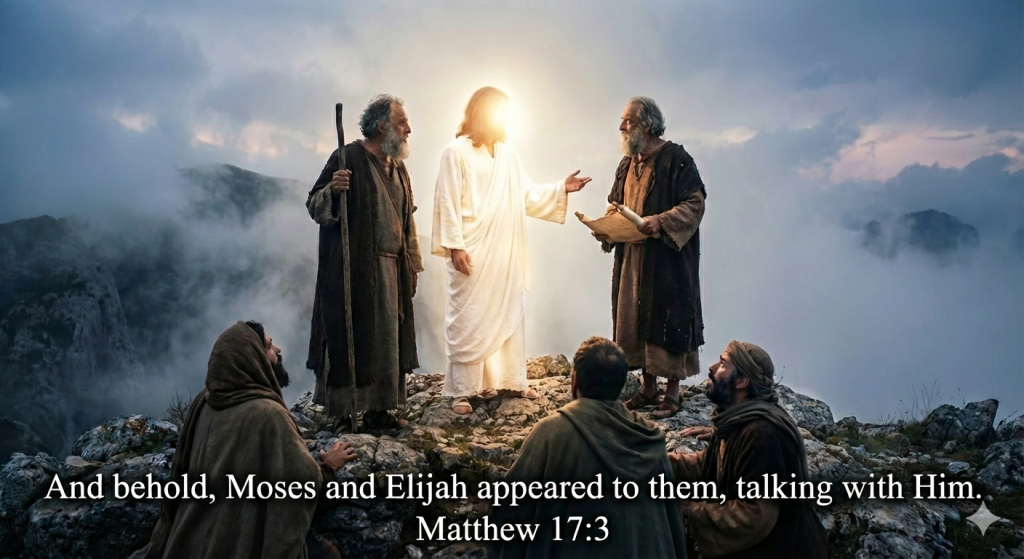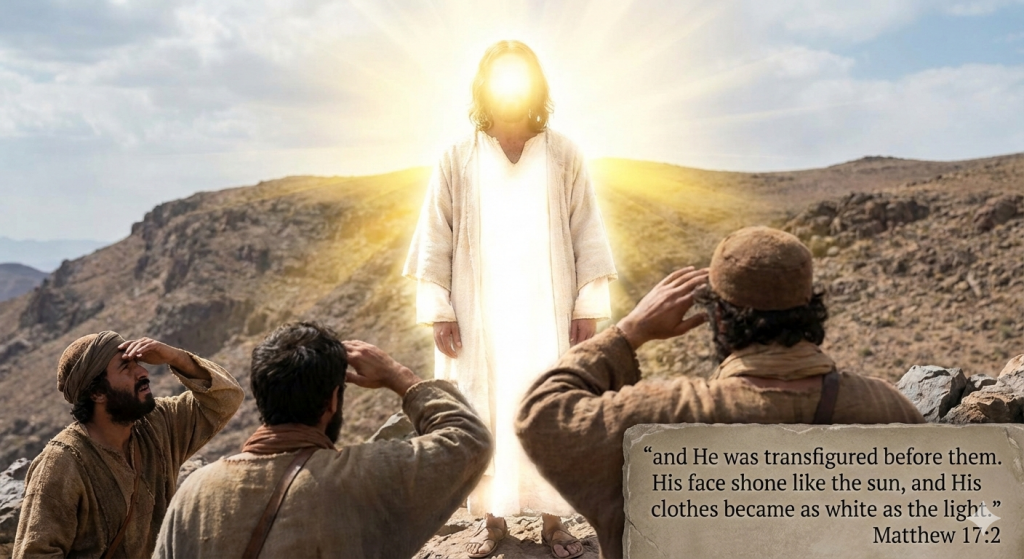Friday, 20 February 2026
And when the disciples heard it, they fell on their faces and were greatly afraid. Matthew 17:6
Note: You can listen to today’s commentary courtesy of our friends at the “Bible in Ten” podcast. (Click Here to listen).
You can also read this commentary, scrolling with music, courtesy of our friends at “Discern the Bible” on YouTube. (Click Here to listen), or at Rumble (Click Here to listen).
“And having heard, the disciples, they fell upon their face, and they feared exceedingly” (CG).
In the previous verse, a cloud overshadowed those on the mountain, and a voice came out of the cloud proclaiming Jesus is God’s beloved Son in whom He is well pleased. Matthew next records, “And having heard, the disciples, they fell upon their face.”
The terror of the event was overwhelming for the disciples. Elsewhere, John records what a voice from heaven sounded like –
“Now My soul is troubled, and what shall I say? ‘Father, save Me from this hour’? But for this purpose I came to this hour. 28 Father, glorify Your name.”
Then a voice came from heaven, saying, “I have both glorified it and will glorify it again.”
29 Therefore the people who stood by and heard it said that it had thundered. Others said, “An angel has spoken to Him.” John 12:27-29
As the disciples were enveloped in the brilliant cloud, they would be mentally confused about the source of the voice. The mental overload could have been magnified depending on how the voice spoke. If it were authoritative, it could have been shocking. If it was a bit miffed, as in, “Forget those others. I want you to focus on My Son,” they could have been fearful for having had the wrong attitude, etc.
A natural reaction would be to fall down and lie prostrate in fear. That is confirmed with the next words, “and they feared exceedingly.”
The disciples, knowing there were three there, and having heard the voices as they conversed, the sudden introduction of another voice with nobody else having been present would have been truly shocking. Peter’s memory was permanently affected by this event. Many years later, he referred to it in his second epistle –
“For we did not follow cunningly devised fables when we made known to you the power and coming of our Lord Jesus Christ, but were eyewitnesses of His majesty. 17 For He received from God the Father honor and glory when such a voice came to Him from the Excellent Glory: ‘This is My beloved Son, in whom I am well pleased.’ 18 And we heard this voice which came from heaven when we were with Him on the holy mountain.” 2 Peter 1:16-18
Life application: At some point in human history, the Lord will return for His church. We have no idea when that will be. All the speculation in the world is wasted time that could have been used to do something productive for the Lord.
When He comes, the Bible says this will be how it occurs –
“For the Lord Himself will descend from heaven with a shout, with the voice of an archangel, and with the trumpet of God. And the dead in Christ will rise first. 17 Then we who are alive and remain shall be caught up together with them in the clouds to meet the Lord in the air. And thus we shall always be with the Lord.” 1 Thessalonians 4:16, 17
We will hear the shout of the Lord. Now imagine what that will be like for people under different circumstances. Some may be in church praising Him. Hearing that should be a glorious moment as the joy of those who were praising Him has found its true purpose.
Another group will be working, some in very tedious jobs. That will be a call to rest from their labors. It will be a relief for the weary, toiling souls. Another group might be people on the beach or on a mountain hiking. The majesty or beauty of their surroundings will suddenly mean nothing compared to the glory that lies ahead.
Others, however, might be engaged in stealing from Walmart, cheating with their neighbor’s wives, or doing other things that Christians should not be engaged in. Their final acts on this earth before being taken to glory will be a source of embarrassment and shame.
How do you want your last moments before Jesus comes to be remembered? We should focus our minds on Him and honor Him at all times. We should have our eyes directed to Him and our activities in line with what He would find pleasing in His eyes.
The Lord is coming, and we don’t know when. Be about your business with that in mind.
Lord God, help us to spend our time wisely as we await Your return for us. We may die before that day and await Your call from the sleep of death, but You may come while we are still alive. Give us wisdom to remember that day, considering it at all times as we contemplate a better life in Your presence forever. Amen.





